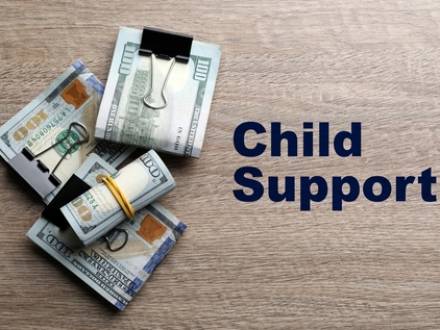LET US BE YOUR FAMILY'S ADVOCATE
Recent Blog Posts
What Are the Best Interests of a Child in a Divorce?
 Divorce is a life-changing event, and for parents, the biggest concern is often their child’s future. How do you shield your child from conflict, ensure their emotional well-being, and protect your relationship? These are not just personal goals — they are legal ones, too. In Texas, child custody decisions are made based on what is in the best interest of the child. That same principle can guide you through the divorce process with purpose and care.
Divorce is a life-changing event, and for parents, the biggest concern is often their child’s future. How do you shield your child from conflict, ensure their emotional well-being, and protect your relationship? These are not just personal goals — they are legal ones, too. In Texas, child custody decisions are made based on what is in the best interest of the child. That same principle can guide you through the divorce process with purpose and care.
Our Collin County, TX divorce attorneys are here to help you keep your child at the center of your decisions.
What Does "Best Interest of the Child" Mean in Texas?
Under Texas Law, family law courts evaluate several factors to determine what is in a child’s best interest. These include the child’s physical and emotional needs, each parent’s ability to meet those needs, and the overall stability and safety of each home. Judges may also consider the child’s preferences, especially if the child is 12 or older.
What Happens to Debt During a Divorce in Texas?
 During a divorce, the process of dividing assets can be brutal, especially if you are dealing with a contentious, high-asset divorce. Unfortunately, property division also involves distributing debts among the parties involved. This can include credit cards, bank loans, car payments, and more. First, you have to determine what counts as marital debt, making it eligible for division. When you enlist the help of a McKinney, TX divorce attorney, you will know your rights and have a skilled legal advisor on your side throughout the process.
During a divorce, the process of dividing assets can be brutal, especially if you are dealing with a contentious, high-asset divorce. Unfortunately, property division also involves distributing debts among the parties involved. This can include credit cards, bank loans, car payments, and more. First, you have to determine what counts as marital debt, making it eligible for division. When you enlist the help of a McKinney, TX divorce attorney, you will know your rights and have a skilled legal advisor on your side throughout the process.
Is Debt Considered Community Property?
Texas is one of nine community property states, and community property states consider most property acquired during the marriage as belonging to both spouses. This also includes most debt. During divorce proceedings, debt is typically divided equally between spouses. However, because Texas law allows for fault-based divorce, the split can be adjusted if there is proof of certain actions during the marriage, including domestic violence and adultery.
What Is a Texas Non-Marital Cohabitation Agreement?
 As our society’s acceptance of couples living together has changed, 59 percent of adults between the ages of 18 and 44 have lived with an unmarried partner at some point in their lives. Marriage rates have correspondingly dropped, with only about 53 percent of adults over the age of 18 currently married, down from 58 percent 30 years ago. Overall, the share of Americans living with an unmarried partner has risen from 3 percent in 1995 to 7 percent.
As our society’s acceptance of couples living together has changed, 59 percent of adults between the ages of 18 and 44 have lived with an unmarried partner at some point in their lives. Marriage rates have correspondingly dropped, with only about 53 percent of adults over the age of 18 currently married, down from 58 percent 30 years ago. Overall, the share of Americans living with an unmarried partner has risen from 3 percent in 1995 to 7 percent.
Almost 70 percent of Americans find cohabitation acceptable, even if the couple has no plans to marry, with only 14 percent saying it is "never acceptable" for an unmarried couple to live together. As more and more couples choose to live together without a marriage license, a non-marital cohabitation agreement has become more important than ever.
What Are Geographic Restrictions in a Texas Custody Case?
 You may have heard someone refer to geographic restrictions in a Texas child custody case. Broadly, these restrictions refer to where a child lives following a divorce or separation and whether the parent with primary custody can move outside the specified area without permission from the court. Geographic restrictions are usually outlined in the custody agreement between parents, with the goal of maintaining an ongoing relationship with both parents for the child.
You may have heard someone refer to geographic restrictions in a Texas child custody case. Broadly, these restrictions refer to where a child lives following a divorce or separation and whether the parent with primary custody can move outside the specified area without permission from the court. Geographic restrictions are usually outlined in the custody agreement between parents, with the goal of maintaining an ongoing relationship with both parents for the child.
Geographic restrictions are also meant to ensure that one parent does not relocate without the other’s consent when that relocation adversely affects co-parenting responsibilities. If you are the primary custodial parent and want to move a significant distance from your child’s other parent, it is important that you not do so without speaking to a skilled McKinney, TX family law attorney.
Do All Texas Custody Orders Include Geographic Restrictions?
Most Texas family courts will include geographic restrictions in the custody orders. In most counties, this restriction is fairly broad. Most geographic restrictions confine the custodial parent to living in his or her current county and "all contiguous counties" to that current county.
Why Would a Texas Judge Order Above-Guideline Child Support?
 Like most states, Texas has guidelines that a judge follows when calculating child support. These guidelines ensure fairness for every parent who is receiving or paying child support. However, there are certain situations when a Texas court could order child support payments that exceed the stated guidelines. If you have a situation that warrants an above-guideline child support award, it is important to discuss the matter with a highly skilled McKinney, TX family law attorney.
Like most states, Texas has guidelines that a judge follows when calculating child support. These guidelines ensure fairness for every parent who is receiving or paying child support. However, there are certain situations when a Texas court could order child support payments that exceed the stated guidelines. If you have a situation that warrants an above-guideline child support award, it is important to discuss the matter with a highly skilled McKinney, TX family law attorney.
How is Child Support Determined in Texas?
Texas has a fairly straightforward method of determining child support. For the first $9,200 per month of the non-custodial parent’s net resources, child support is determined through a percentage scale: one child: 20 percent of net resources, two children: 25 percent, three children: 30 percent, four children: 35 percent, five children: 40 percent, and six or more children: not less than 40 percent.
I Live "Off Grid" – Could This Affect My Child Custody?
 Child custody cases can get very emotional and contentious. While this is true in many cases, it is especially true when one parent believes the other cannot provide a stable, safe home for the child. Family court judges make custody decisions based on the best interests of the child, including considerations of whether one parent’s home is unstable.
Child custody cases can get very emotional and contentious. While this is true in many cases, it is especially true when one parent believes the other cannot provide a stable, safe home for the child. Family court judges make custody decisions based on the best interests of the child, including considerations of whether one parent’s home is unstable.
The situation must include such things as financial instability, abuse, violence, dangers to the child’s safety and health, lack of access to essential needs, and more. If you are worried that your off-grid lifestyle may cause you to receive an adverse custody decision, it is important that you speak to an experienced McKinney, TX family law attorney.
What is Considered an "Unstable" Home for Child Custody Purposes?
Under Texas law, there is no single, explicit legal definition of an unstable home and no single, explicit legal definition of an unfit parent. The judge in a custody case must evaluate a wide range of factors to determine whether a parent is unfit or a home is unstable. In this particular case, it would be assumed that your spouse has raised alarm bells regarding the stability of your off-grid home.
Proving Separate Property in a Texas Divorce
 The line between separate and marital property can become blurry throughout a marriage, making it more difficult to claim separate property during a Texas divorce. Despite the difficulties, proving that an asset is separate or non-marital can be crucial to your future financial security. Since Texas is a community property state, this means that marital assets are divided right down the middle, regardless of any extenuating circumstances.
The line between separate and marital property can become blurry throughout a marriage, making it more difficult to claim separate property during a Texas divorce. Despite the difficulties, proving that an asset is separate or non-marital can be crucial to your future financial security. Since Texas is a community property state, this means that marital assets are divided right down the middle, regardless of any extenuating circumstances.
The burden of proof lies on the spouse who claims an asset is separate rather than on the other spouse who seeks to divide the asset as marital. Since determining which assets remain the sole property of one spouse can be complex, it is not recommended that you do this on your own. It is important to speak to an experienced family law attorney when your financial well-being is at stake.
Four Common Myths About Prenuptial Agreements
 The idea of a prenuptial agreement may spark heated debates, as many see it as an instrument of distrust or a sign that at least one party expects the marriage to end in divorce. In truth, a prenuptial agreement should protect both parties in the event of a divorce in the same way your homeowner’s insurance protects you in the event of a disaster or your health insurance protects you should you become ill.
The idea of a prenuptial agreement may spark heated debates, as many see it as an instrument of distrust or a sign that at least one party expects the marriage to end in divorce. In truth, a prenuptial agreement should protect both parties in the event of a divorce in the same way your homeowner’s insurance protects you in the event of a disaster or your health insurance protects you should you become ill.
A properly prepared prenuptial agreement should be viewed as a form of "insurance," should the unthinkable happen. There are many fallacies regarding prenuptial agreements that are often taken as the truth, while many truths about prenuptial agreements are easily overlooked. If you are considering a prenuptial agreement, having an experienced McKinney, TX family law attorney answer your questions and guide you through the process can be an invaluable asset.
What You Should Know About High-Conflict Child Custody Cases
 There are very few divorces that do not involve at least some level of stress and emotional pain. While some couples may be able to negotiate asset division and spousal maintenance with at least a modicum of civility, custody issues often bring out the worst in both parents.
There are very few divorces that do not involve at least some level of stress and emotional pain. While some couples may be able to negotiate asset division and spousal maintenance with at least a modicum of civility, custody issues often bring out the worst in both parents.
When the determination of custody and visitation is filled with conflict, you face a situation that is not only financially and emotionally draining but also legally complex. Having a highly experienced McKinney, TX child custody lawyer who can guide you through these legal negotiations is extremely important.
When a Parental "Win" May Not Be in the Child’s Best Interests
Regarding child custody and visitation, the concept of "winning" is not really applicable unless the win is from the child’s perspective. The courts are only concerned with finding a custody arrangement that is in the child's best interests. Unless there is evidence to the contrary, the courts will assume that time spent with both parents accomplishes that goal.
The Importance of Retirement Division in a Gray Divorce
 Senior baby boomers are currently experiencing divorce rates that are triple those of only a few decades ago. This phenomenon is known as "gray divorce," describing those 65 and older who are divorcing. In 1990, divorce rates among this demographic were about 5 percent, but in 2022, those numbers had increased to 15 percent.
Senior baby boomers are currently experiencing divorce rates that are triple those of only a few decades ago. This phenomenon is known as "gray divorce," describing those 65 and older who are divorcing. In 1990, divorce rates among this demographic were about 5 percent, but in 2022, those numbers had increased to 15 percent.
There are many reasons for divorces later in life, including having no children remaining at home, arguments over money, retirement disagreements, infidelity, health challenges including serious chronic conditions, changing expectations, and simply growing apart. While divorce has economic impacts at any age, some considerations are particularly significant for older adults, including the division of one spouse’s retirement fund.
Finding The Right Attorney Matters. Contact Us Today.
A family lawyer does much more than simply provide legal answers. Our lawyers explore a variety of different solutions to help you achieve your goals and secure your family's financial and emotional future and stability.
To discuss your case or set up a consultation, call us at 972-562-9890 or use the online contact form.

















